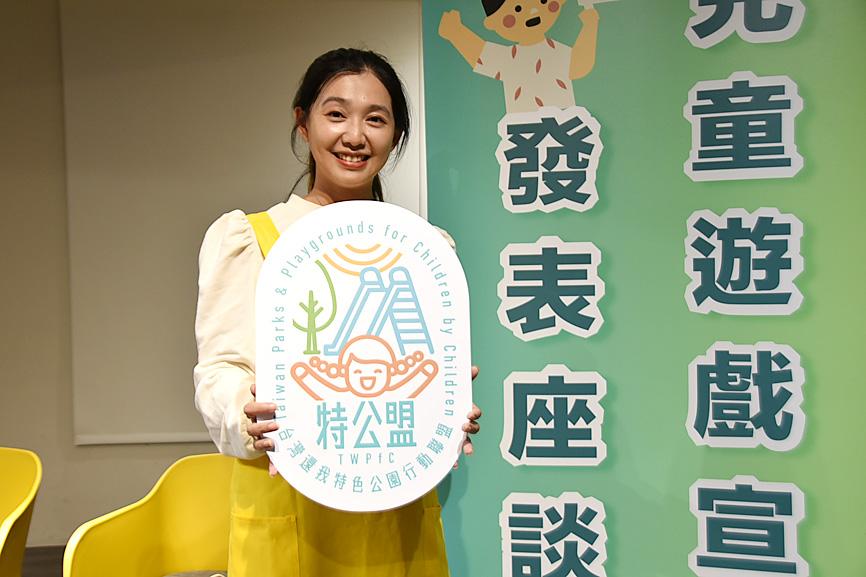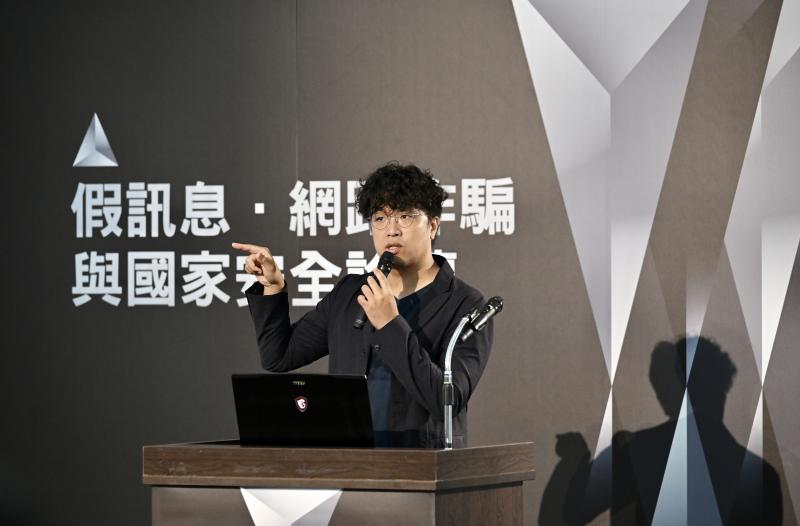The Democratic Progressive Party (DPP) yesterday unveiled its legislator-at-large nominees for next year’s election, with Kuma Academy cofounder Puma Shen (沈伯洋) joining party stalwarts Legislative Speaker You Si-kun (游錫堃) and party caucus whip Ker Chien-ming (柯建銘) at the top of the list.
The DPP Central Standing Committee finalized and approved the nominees at its regular midweek meeting.
Six men and six women make up the first 12 nominees, considered “safe positions” in winning enough votes to serve as legislators next year.

Photo: Wu Po-hsuan, Taipei Times
Legislators-at-large are elected through political party ballots. The New Power Party, the Taiwan Statebuilding Party and the Green Party Taiwan have already decided their nominees, while the Chinese Nationalist Party (KMT) has delayed its announcement to Sunday.
First on the DPP list is Jing Chuan Child Safety Foundation director Lin Yue-chin (林月琴), followed by Shen, a criminology professor at National Taipei University and chairman of Doublethink Lab.
He is also cofounder of the Kuma Academy, a nonprofit civil defense organization that trains people in first aid and media literacy to combat Chinese disinformation.

Photo: Lo Pei-der, Taipei Times
“We are facing ever-changing situations in cyberattacks and infiltration from an enemy state, and it is not just the civilians who should prepare to defend Taiwan, but our government must also establish systems to safeguard our nation,” Shen said yesterday.
As a legislator-at-large, he would seek to set up defense networks to combat the cognitive warfare Taiwanese need to guard against, he said.
Third on the list is Taiwan Parks and Playgrounds for Children by Children chairwoman Ariel Chang (張雅琳), followed by Legislator Hung Sun-han (洪申翰), an environmentalist and advocate for renewable energy.
At No. 5 is Malaysia-born Legislator Lo Mei-ling (羅美玲), who represents “new Taiwanese citizen groups,” such as foreigners married to Taiwanese. Lo previously served as a Nantou County councilor before becoming a legislator in 2020.
You is listed at No. 6, followed by Legislator Fan Yun (范雲), a women’s rights advocate, professor of sociology and founder of the Social Democratic Party.
At No. 8 is Ker, who represents Hsinchu City and has served in the legislature for nine consecutive terms over two decades.
Ker is followed by current legislators who represent powerful groups within the DPP: Shen Fa-hui (沈發惠) of the New Tide faction, Chuang Jui-hsiung (莊瑞雄) of a faction close to President Tsai Ing-wen (蔡英文) and DPP spokeswoman Michelle Lin (林楚茵) of the Taiwan Forward Foundation, founded by media tycoon Lin Kun-hai (林崑海), who died last year.
Listed at No. 12 is entertainer and TV show host Jean Kuo (郭昱晴), who is also an artist and author, followed by Hope Foundation for Cancer Care chairman Wang Cheng-hsu (王正旭), who represents medical professionals, and civil engineering professor Wang Yi-chuan (王義川), a popular pundit on TV news and chief strategist at the Taiwan Thinktank.
Notably absent from the list is former minister of health and welfare Chen Shih-chung (陳時中), who gained wide appeal for his efforts during the COVID-19 pandemic, but lost as the DPP’s candidate in Taipei’s mayoral election last year.

Chinese Nationalist Party (KMT) Chairman Eric Chu (朱立倫), spokeswoman Yang Chih-yu (楊智伃) and Legislator Hsieh Lung-chieh (謝龍介) would be summoned by police for questioning for leading an illegal assembly on Thursday evening last week, Minister of the Interior Liu Shyh-fang (劉世芳) said today. The three KMT officials led an assembly outside the Taipei City Prosecutors’ Office, a restricted area where public assembly is not allowed, protesting the questioning of several KMT staff and searches of KMT headquarters and offices in a recall petition forgery case. Chu, Yang and Hsieh are all suspected of contravening the Assembly and Parade Act (集會遊行法) by holding

PRAISE: Japanese visitor Takashi Kubota said the Taiwanese temple architecture images showcased in the AI Art Gallery were the most impressive displays he saw Taiwan does not have an official pavilion at the World Expo in Osaka, Japan, because of its diplomatic predicament, but the government-backed Tech World pavilion is drawing interest with its unique recreations of works by Taiwanese artists. The pavilion features an artificial intelligence (AI)-based art gallery showcasing works of famous Taiwanese artists from the Japanese colonial period using innovative technologies. Among its main simulated displays are Eastern gouache paintings by Chen Chin (陳進), Lin Yu-shan (林玉山) and Kuo Hsueh-hu (郭雪湖), who were the three young Taiwanese painters selected for the East Asian Painting exhibition in 1927. Gouache is a water-based

Taiwan would welcome the return of Honduras as a diplomatic ally if its next president decides to make such a move, Minister of Foreign Affairs Lin Chia-lung (林佳龍) said yesterday. “Of course, we would welcome Honduras if they want to restore diplomatic ties with Taiwan after their elections,” Lin said at a meeting of the legislature’s Foreign Affairs and National Defense Committee, when asked to comment on statements made by two of the three Honduran presidential candidates during the presidential campaign in the Central American country. Taiwan is paying close attention to the region as a whole in the wake of a

OFF-TARGET: More than 30,000 participants were expected to take part in the Games next month, but only 6,550 foreign and 19,400 Taiwanese athletes have registered Taipei city councilors yesterday blasted the organizers of next month’s World Masters Games over sudden timetable and venue changes, which they said have caused thousands of participants to back out of the international sporting event, among other organizational issues. They also cited visa delays and political interference by China as reasons many foreign athletes are requesting refunds for the event, to be held from May 17 to 30. Jointly organized by the Taipei and New Taipei City governments, the games have been rocked by numerous controversies since preparations began in 2020. Taipei City Councilor Lin Yen-feng (林延鳳) said yesterday that new measures by